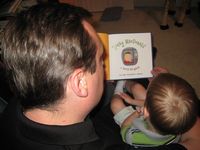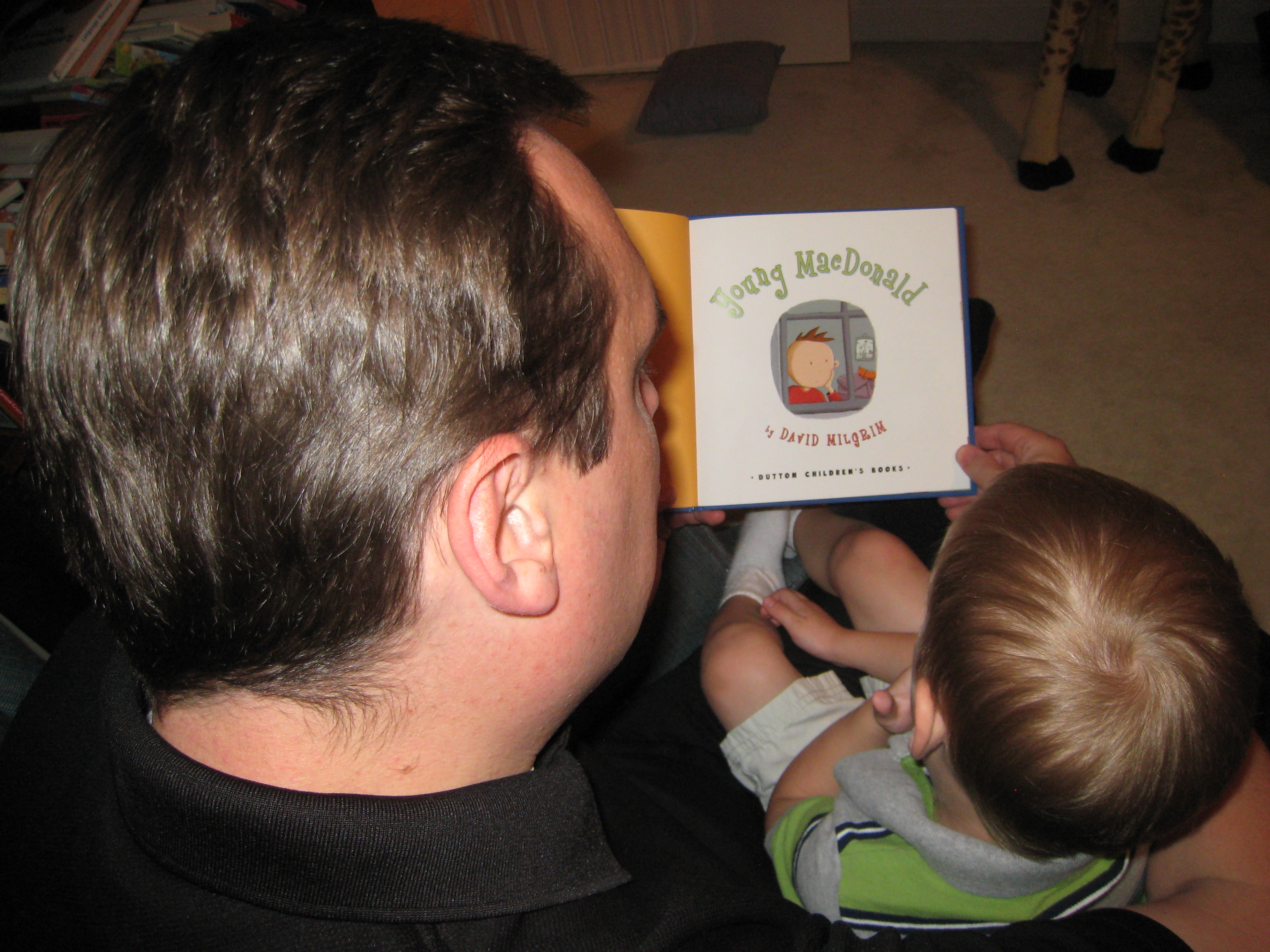(Part of the To-Do List for Lexington series. Click here for an overview and links to the rest of the series.)
Every night we go through the same routine.
 After he takes his bath and gets his pajamas on, we go to his room. I sit in the recliner, and he clambers up into my lap. We pull a book from the shelf – the books are getting longer now – and I add a bit of vocal drama as I read to him.
After he takes his bath and gets his pajamas on, we go to his room. I sit in the recliner, and he clambers up into my lap. We pull a book from the shelf – the books are getting longer now – and I add a bit of vocal drama as I read to him.
His little brain absorbs everything – pictures, sounds, words. He asks lots of questions now, too. We finish the book, and place it back on the shelf.
I pick him up, and we say good night to mementos from his young life, scattered about the room. It started with 2 or 3 items after finishing Goodnight Moon, but has steadily grown to a list of 13 things: a stuffed polar bear and penguin from his great-grandmother, a huge stuffed giraffe, and an array of other objects from around the room.
I take him down the hall to say a final good night to Mommy, and we go back to his room. I sit back in the recliner as he turns out the light, and we find each other in the darkness. I pull him up into my lap, and give him a little water to drink. I tell him “that’s enough”, and place the cup back on the shelf.
I pull him up onto my chest, and he places his head on my shoulder. After a few seconds of silence, I tell him I love him in Spanish: “Te amo, Carson” and he responds “te amo, Daddy”*. He’s starting to get tired now, and his words are slurring slightly. I then quote from one of my favorite baby books, and he matches my cadence shortly after I start: “I love you through and through – yesterday, today, and tomorrow, too.” Then, “I love you, Carson” followed by a barely audible “I love you, Daddy”.
I hold him tight. In the darkness, silent except for our slow breathing, I feel the twinge of nostalgia for this moment. He turns 3 this week. He’s growing so fast, and it won’t be too long before he needs to be independent from hugs and kisses from his dad. It won’t be long before we won’t experience this kind of closeness.
My mind wanders a bit as I ponder our future, his future. I am holding so much potential in my arms. What kind of world will he inherit?
I get up from the recliner and place him in his bed. I tuck him in with three more stuffed animals, and kiss his forehead. He stirs a bit to get comfortable, and I leave his room. “Good night Carson. I love you. See you in the morning.”
::
I often get asked why I speak out so much on this blog – especially during this To-Do List for Lexington series. Behind the questions are a variety of thoughts about my motives:
- Some folks think that I must have an enormous ego, and that I believe that I have all of the answers.
- Others think that I must be preparing to run for elected office, and these posts are part of some sort of political platform.
- Some people – including members of my family – think I’m just crazy.
They’re all wrong.
I may or may not have a huge ego, but I don’t assume I have all of the answers. I am perfectly willing to engage in democratic debate on these ideas.
I don’t have the time or patience to devote to political office. I’ve seen the demands on elected representatives, and the kinds of people they deal with day-to-day. This isn’t a political platform. (Not for me, anyway.)
And, I’m not crazy. Well… at least as far as my motives behind my writing.
The underlying assumption most folks have is that there is huge risk to speaking out, especially when addressing powerful interests in our city. I could scare away customers. The powerful could make life more difficult for me or for my family or for my employees.
And those risks may or may not be real.
But there is an even greater, very real risk in not speaking out, in being quiet.
There is the risk that we pursue the wrong kinds of economic development. There is the risk of wasteful spending in the face of economic crisis. There is the risk of choking off our city’s downtown. There is the risk of further stagnation in the local economy.
There is the risk that Lexington loses what makes it a special place to live and work – that Lexington becomes less than it should be.
I find that those risks to our future far outweigh the risks of speaking out. I would be ‘crazy’ to remain silent.
::
I want Lexington to be special. I want it to be a vibrant, exciting, growing kind of place that my son can stay in and prosper. I want Lexington to be better. And I hope that you do, too.
That is why I speak out. That is why I hope you will join me. Let’s craft a better future for our city. For ourselves. For our children.
I love you, Carson.
* I know that “te amo” is usually reserved for romantic love, and that “te quiero” is probably more appropriate, but this habit was ingrained before I caught my error… We’ll fix it later.




